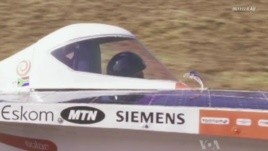From VOA Learning English, this is the Technology Report.
Students at the University of Johannesburg in South Africa are building solar-powered cars and racing them in competitions. The University is training the students to become experts in different types of energy.
Their 300-kilogram solar-powered car is traveling at more than 100 kilometers per hour through the South African countryside, and it is using less electric power than a small kitchen appliance. The young engineers who built the car drove it in the Solar Challenge, a national racing competition for cars that use alternative energy.

Solar-powered cars.
Kegan Smith is the former manager of the project and a lecturer at the University of Johannesburg. He says the university wants the students to learn about green energies using realistic examples.
"With what we do at the moment in fossil fuels, if we continue like this, there is not going to be a future. And if we do this kind of alternative energy, the cars are one application. But the nice thing with the cars it that it's a mindset change. If you can start shaping students' mind now, it's going to change the mindset of people in general. How do you use your lights? How do you use your electricity?" explained Smith.
When he was a student in 2010, Mr Smith was part of a group that built a hybrid alternative-energy powered car. Since then, students have built more cars using both hydrogen and solar power.
Warren Larter is also a former student, he is the university's solar car project manager. He says he does not expect solar-powered cars to be more popular than gasoline-powered cars, but Mr Larter says, they do offer an important learning tool to help students develop new technologies.
"For us, it's a research thing. Our exact example is Formula One. You'll never see those cars on the road, but the technologies that go into them, you see it in every single car in every single household across the world. So that's where we are pushing it. This is our Formula One of alternative energy," said Larter.
Warren Larter started a company that lets students to work on projects that private companies have expressed an interest in supporting. He says the energy market is changing, and there is a great need for engineers with more modern experience.
"Locally, there is a lack of experts in alternative energy and in particular in solar technology. We seem to be importing a lot at this stage, which is not ideal... We should have the experts locally, so a project like this really pushes that. We have guys working with the solar panels, working on different aspect of the project. So instead of importing the guys and flying them in to work on this, we use the local guys, so they know just as much and can even do better than the international guys," said Larter.
Kegan Smith agrees. "I got guys working on huge systems on the telecom sites, because that's what they did in the cars. So the experience they gain from the cars are now working towards it in the industry," said Smith.
Warren Larter and his team of students are now working on a third car to enter into the next Solar Challenge in August 2014. They want to win the national competition and then compete internationally.
And that is the Technology Report from VOA Learning English. For more of our reports, visit our website, learningenglish.voanews.com. We are also on Facebook, YouTube, LinkedIn, iTunes and Twitter at VOA Learning English. I'm June Simms.
文本来自51voa,译文属可可原创,仅供学习交流使用,未经许可请勿转载













